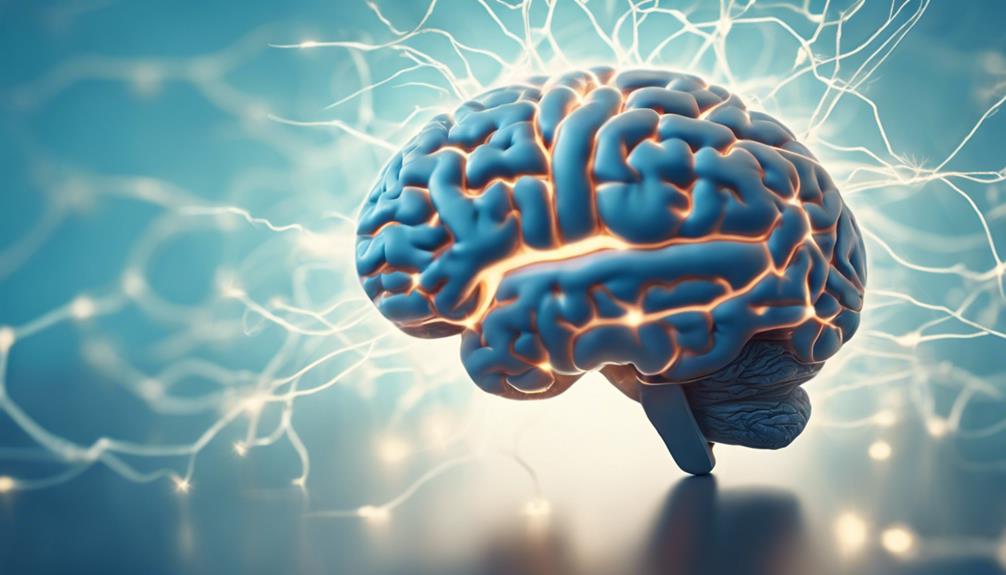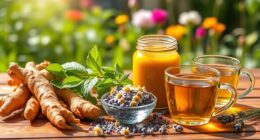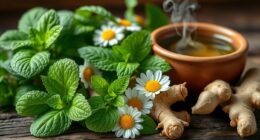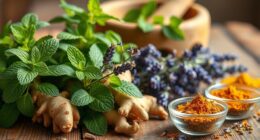Boosting brain healing for faster recovery involves a vital approach. Nourishing the brain with antioxidants, omega-3 fatty acids, and vitamins is essential, as they combat oxidative stress, support neuronal health, and promote neuroplasticity. Regular physical activity optimizes brain function, increases blood flow, and enhances cognitive resilience. Mindfulness practices, such as meditation, foster brain plasticity, reducing stress and anxiety. Advanced therapies, including neuroplasticity-based treatments and pharmacotherapy, accelerate brain healing. By combining these strategies, individuals can optimize brain function, reduce the risk of neurodegenerative conditions, and ultimately promote faster recovery. As researchers continue to uncover the complexities of brain healing, a thorough understanding of these factors will be pivotal for effective treatment.
Key Takeaways
• A diet rich in antioxidants, omega-3 fatty acids, and vitamins supports brain health and accelerates recovery.
• Regular exercise, such as aerobic and strength training, optimizes brain function and promotes neuroplasticity.
• Mindfulness practices, including meditation, foster brain plasticity, reduce stress, and promote cognitive well-being.
• Advanced therapies like HBOT, TMS, and stem cell therapy can accelerate brain healing and repair.
• Combining neuroprotection, a balanced diet, regular exercise, and stress reduction techniques enhances overall brain wellness and promotes faster recovery.
Nourishing the Brain for Recovery
A well-balanced diet rich in antioxidants, omega-3 fatty acids, and vitamins lays the foundation for a faster and more efficient brain recovery process. A nutrient-rich diet provides the necessary building blocks for ideal brain function, accelerating the healing process.
Antioxidants, found in berries and leafy greens, combat oxidative stress, while omega-3 fatty acids, abundant in fatty fish, support neuronal health. Vitamins, particularly BDNF-boosting vitamin D, play a significant role in neuroplasticity.
A diet rich in whole foods, fruits, and vegetables supports immediate and long-term brain health, setting the stage for a successful recovery. As Dr. Mark Hyman notes, 'Food is medicine, and the right diet can be a powerful tool in healing and recovery.' By incorporating nutrient-dense foods, individuals can optimize their brain health and lay the groundwork for a faster, more efficient recovery.
Exercise for Brain Health and Function
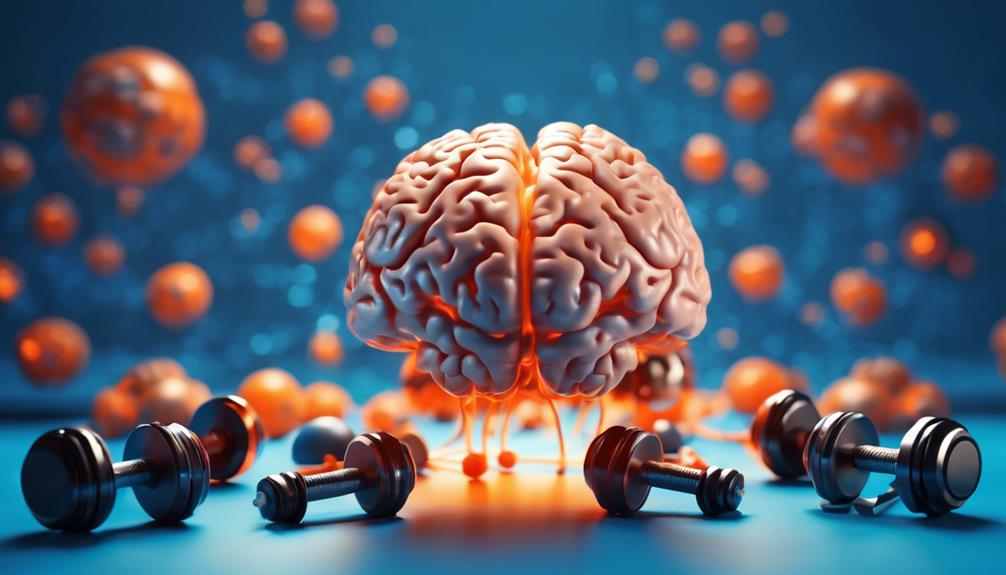
As the foundation of a healthy brain is laid with a nutrient-rich diet, regular physical activity emerges as a synergistic partner in optimizing brain function and accelerating recovery.
Exercise plays a pivotal role in enhancing brain health by increasing blood flow, promoting neuroplasticity, and stimulating the growth of new neurons. Aerobic exercises, in particular, have been shown to improve cognitive functions, boost mood, and reduce stress levels. Strength training, on the other hand, helps regulate stress hormones and enhances cognitive resilience.
Mindful Cognitive Well-being Strategies
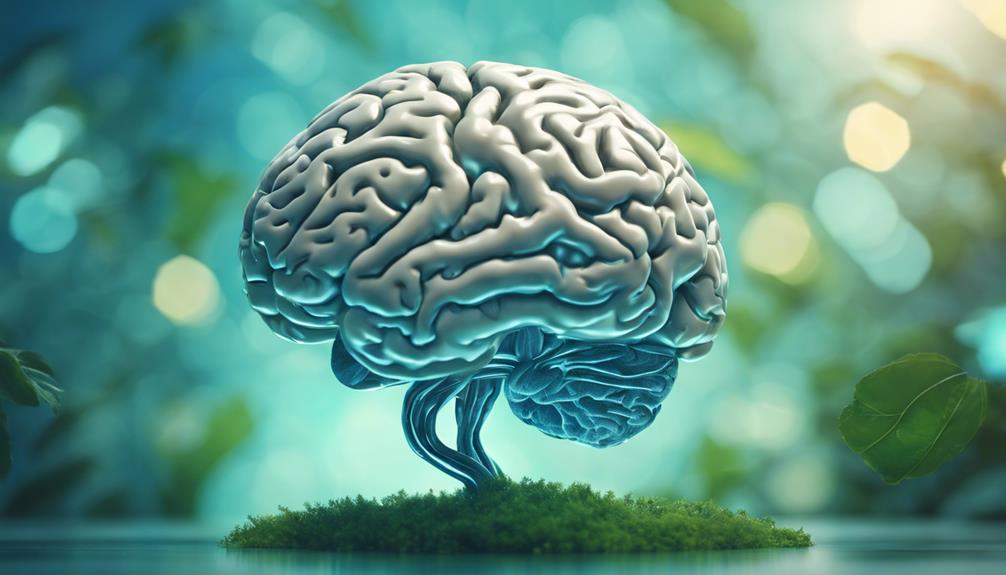
Mindfulness practices, such as meditation and cognitive training, foster brain plasticity by creating new neural connections and strengthening existing ones, ultimately leading to improved cognitive well-being.
By reducing stress and anxiety, mindfulness practices promote a healthy brain environment, allowing for peak cognitive function.
Regular mindfulness practice has been shown to increase grey matter in the brain, leading to improved emotional regulation and memory.
According to a study published in the journal NeuroImage, 'long-term meditators showed increased grey matter density in the hippocampus, an area important for learning and memory.'
Advanced Therapies for Brain Repair
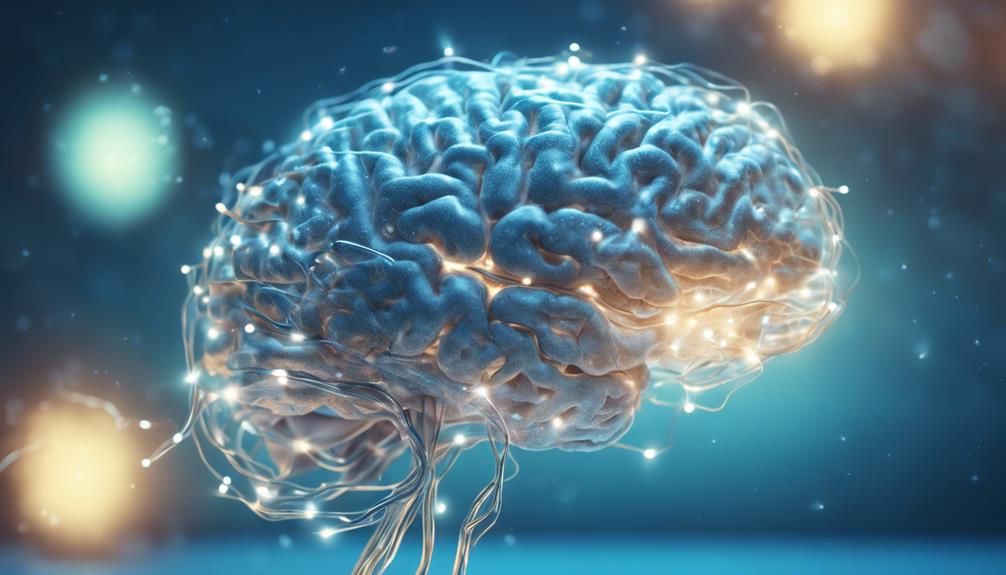
By harnessing the power of innovative treatments, researchers and clinicians are developing advanced therapies that accelerate brain repair and recovery. Neuroplasticity-based therapies focus on forming new neural connections, promoting adaptive changes in the brain.
Advanced therapies like Hyperbaric Oxygen Therapy (HBOT), Transcranial Magnetic Stimulation (TMS), and stem cell therapy have shown promising results in accelerating brain healing. Pharmacotherapy aims to enhance neurogenesis and reduce inflammation, while cognitive rehabilitation techniques restore mental processes post-injury.
Virtual reality therapy is also being used to accelerate the recovery of motor and cognitive functions. These cutting-edge treatments offer new hope for individuals seeking to overcome brain injuries and diseases, and researchers are continually exploring new avenues to optimize brain repair and recovery.
Optimizing Brain Function and Wellness

Researchers are uncovering the pivotal role of neuroprotection in reducing the risk of neurodegenerative conditions, which in turn enhances emotional well-being through endorphin production and mental resilience. Optimizing brain function and wellness is essential for faster recovery. A balanced diet rich in antioxidants, omega-3 fatty acids, and vitamins supports brain health. Regular physical activity, stress reduction techniques, and adequate sleep quality also play a significant role.
| Category | Strategy | Benefit |
|---|---|---|
| Nutrition | Consume antioxidant-rich foods | Reduces oxidative stress |
| Physical Activity | Engage in aerobic exercises | Improves blood flow to the brain |
| Mental Health | Practice mindfulness and meditation | Enhances cognitive resilience |
| Sleep Quality | Aim for 7-8 hours of sleep | Supports brain rejuvenation |
Frequently Asked Questions
Can Brain Injuries Be Prevented Through Lifestyle Changes?
While it's impossible to completely eliminate the risk of brain injuries, certain lifestyle changes can greatly reduce the likelihood of occurrence. A nutrient-rich diet, regular physical activity, and adequate sleep can all contribute to peak brain health.
Additionally, managing stress through mindfulness and meditation, as well as wearing protective gear during high-impact activities, can also help prevent brain injuries. By adopting these habits, individuals can take proactive steps towards minimizing their risk of brain injury.
How Quickly Can I Expect to See Results From Brain Rehab?
As the ancient Greek physician Hippocrates once said, 'Everything in excess is opposed to nature.' Similarly, when it comes to brain rehab, patience is key.
The timeline for seeing results varies depending on individual circumstances, but most people start noticing improvements within 3-6 months. According to the National Institute of Neurological Disorders and Stroke, 'rehabilitation is a long-term process that requires ongoing effort and commitment.'
With consistent effort, individuals can expect to see significant progress within a year.
Are There Age Limits for Brain Recovery and Rehabilitation?
She notes that age isn't a limiting factor in brain recovery and rehabilitation.
While it's true that brain plasticity decreases with age, research shows that the brain can reorganize and adapt throughout life.
In fact, a study published in the journal Neurology found that older adults can still experience significant cognitive improvements with targeted interventions.
Can Nutritional Supplements Replace a Healthy Diet for Brain Health?
While nutritional supplements can support brain health, they can't entirely replace a healthy diet.
A well-balanced diet provides essential nutrients, antioxidants, and omega-3 fatty acids that aid brain healing and function.
Supplements can fill nutritional gaps, but relying solely on them can lead to imbalances and deficiencies.
As the National Institute on Aging states, 'A healthy diet is the best way to get the nutrients your brain needs.'
Are There Any Risks or Side Effects of Advanced Brain Therapies?
According to a study, approximately 30% of patients undergoing advanced brain therapies experience mild to moderate side effects.
While advanced brain therapies like HBOT, TMS, and stem cell therapy show promising results, potential risks and side effects can't be overlooked. These may include headaches, fatigue, and mild cognitive impairment.
As Dr. Maria Rodriguez, a neurologist, notes, 'It's essential to weigh the benefits against the potential risks and consult with a healthcare professional before undergoing any advanced brain therapy.'
Conclusion
In summary, a multi-faceted approach is essential for ideal brain healing and recovery. By combining a nutrient-rich diet, regular exercise, mindful cognitive well-being strategies, and advanced therapies, individuals can accelerate their recovery.
According to Dr. Michael Merzenich, a pioneer in neuroplasticity, 'the brain is highly adaptable, and we can rewire it through practice and experience.' By embracing this holistic approach, individuals can harness the brain's remarkable ability to adapt and heal, paving the way for a faster and more effective recovery.

